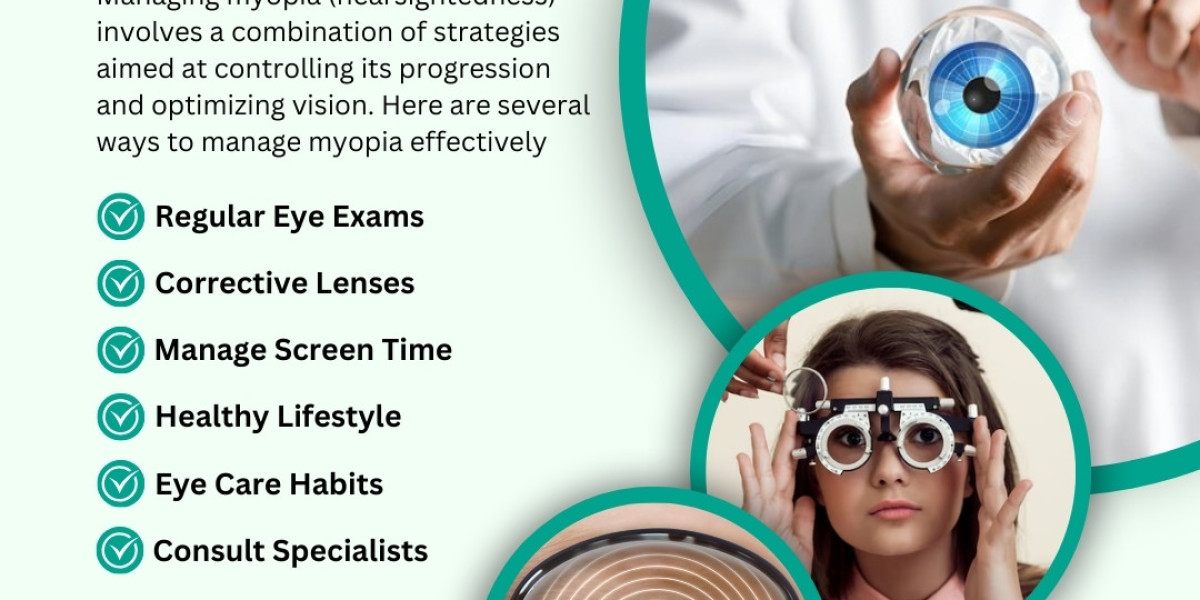Introduction: Myopia, commonly known as nearsightedness, is a refractive error that affects millions of people worldwide. It occurs when the eye focuses light in front of the retina instead of on it, leading to blurred distance vision. Myopia management has become increasingly important in recent years due to its rising prevalence, especially among younger populations. In this blog, we'll explore various tips and strategies to help you manage myopia effectively and maintain good eye health.
Regular Eye Exams: The first step in managing myopia is to schedule regular eye exams with an optometrist or ophthalmologist. These professionals can assess your vision, prescribe corrective lenses if needed, and monitor any changes in your myopia over time. Early detection and intervention can help slow down the progression of myopia.
Use Corrective Lenses Appropriately: If you have myopia, wearing corrective lenses such as glasses or contact lenses is essential for clear vision. Ensure that your prescription is up-to-date and that you use your lenses as directed by your eye care provider. Avoid over-wearing contact lenses and give your eyes regular breaks, especially when using digital devices for extended periods.
Consider Orthokeratology (Ortho-K): Ortho-K is a non-surgical treatment for myopia that involves wearing specially designed rigid contact lenses overnight to reshape the cornea temporarily. This technique can provide clear vision during the day without the need for glasses or daytime contact lenses. However, it's crucial to follow your eye care professional's instructions closely and attend regular follow-up appointments.
Outdoor Time and Visual Hygiene: Spending time outdoors has been linked to a reduced risk of myopia progression, particularly in children. Encourage outdoor activities and limit screen time to promote healthy vision. Practice good visual hygiene by taking regular breaks from near work, maintaining proper lighting, and using ergonomic setups for digital devices.
Consider Myopia Control Treatments: Several myopia control treatments are available, such as low-dose atropine eye drops, multifocal contact lenses, and specialty glasses. These treatments aim to slow down the progression of myopia and reduce the risk of associated eye complications. Consult with your eye care professional to determine the most suitable option for your needs.
Monitor Lifestyle Factors: Certain lifestyle factors can influence myopia progression, such as diet, physical activity, and overall health. A balanced diet rich in nutrients like vitamin A, C, E, and omega-3 fatty acids may support eye health. Regular exercise and proper sleep are also important for overall well-being, which can indirectly benefit your eyes.
Educate and Raise Awareness: Educating yourself and others about myopia and its management is key to promoting eye health awareness. Encourage family members, especially children, to adopt healthy visual habits and seek timely eye care. Discuss the importance of regular eye exams with friends and colleagues to emphasize the significance of early detection and intervention.
Conclusion: Managing myopia like a pro involves a combination of regular eye care, appropriate use of corrective measures, lifestyle adjustments, and informed decision-making regarding myopia control treatments. By taking proactive steps and staying informed about the latest developments in myopia management, you can safeguard your vision and enjoy good eye health for years to come. Remember to consult with your eye care professional for personalized advice and guidance tailored to your specific needs.









